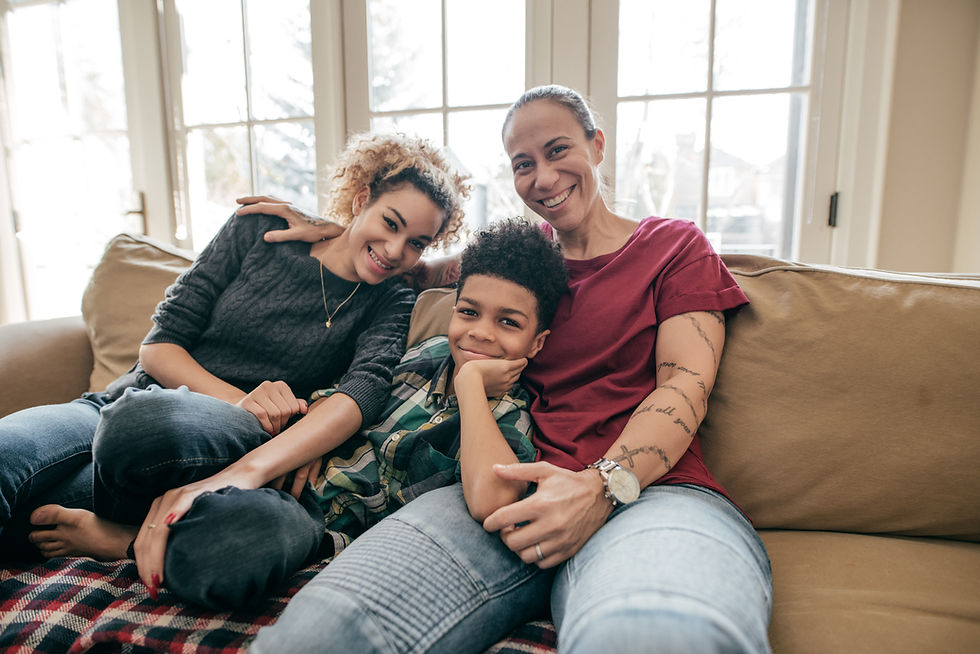Building Bridges: The Role of Empathy in Healthy Relationships
- Andrew Linder

- Jun 5, 2024
- 3 min read

Welcome to week 4 of our Healthy Relationships series!
In the journey of life, relationships are the bridges that connect us to others, offering companionship, support, and love. But, like any bridge, these connections require careful maintenance and a solid foundation to remain strong and enduring. One of the key pillars of this foundation is empathy. Often overlooked, empathy is the magical glue that binds us closer, helping us understand and resonate with the emotions and experiences of those we care about. In this blog post, we will explore the profound impact of empathy in healthy relationships and how you can cultivate this essential quality.
Understanding Empathy
Empathy is the ability to step into someone else’s shoes, to see and feel the world through their eyes. It’s more than just sympathy, which involves feeling pity for someone else’s misfortune. Empathy goes deeper—it’s about truly connecting with another person’s emotional experience, whether it’s joy, sorrow, frustration, or excitement.
Why Empathy Matters
Empathy is a cornerstone of healthy relationships for several reasons:
Enhances Communication: When we empathize, we listen more attentively and speak more thoughtfully. This leads to more meaningful and effective communication, reducing misunderstandings and conflicts.
Builds Trust: Empathy fosters trust by showing that we genuinely care about our partner’s feelings and perspectives. This mutual trust strengthens the relationship’s foundation.
Promotes Emotional Intimacy: Sharing and understanding each other’s emotions deepens emotional intimacy, making the relationship more fulfilling and resilient.
Encourages Mutual Support: Empathy motivates us to support each other in times of need, creating a balanced and supportive partnership.
Cultivating Empathy in Your Relationship
Empathy, like any skill, can be developed with practice and intention. Here are some practical steps to cultivate empathy in your relationship:
Active Listening: Give your full attention when your partner is speaking. Put away distractions and focus on their words, tone, and body language. Reflect back what you hear to ensure understanding.
Ask Open-Ended Questions: Encourage your partner to share their feelings and thoughts by asking questions like, “How did that make you feel?” or “What do you think about this situation?”
Validate Their Emotions: Acknowledge your partner’s feelings without judgment. Statements like “I can see why you feel that way” or “That sounds really tough” show that you respect and understand their emotions.
Practice Perspective-Taking: Try to see situations from your partner’s perspective. Imagine how you would feel in their shoes and consider how their past experiences might influence their reactions.
Show Compassion: Sometimes, empathy involves simply being there for your partner. Offer a hug, a kind word, or a gesture of support when they’re going through a tough time.
Reflect on Your Own Emotions: Understanding your own emotions can help you better relate to others. Practice self-awareness and be mindful of how your feelings impact your interactions.
The Challenges of Empathy
While empathy is crucial for healthy relationships, it’s not always easy. We all have moments of stress, frustration, or distraction that can make it difficult to be fully empathetic. It’s important to recognize these challenges and work through them together as a couple. Here are a few tips for overcoming empathy barriers:
Self-Care: Taking care of your own emotional needs is essential. When you’re feeling overwhelmed, it’s harder to be empathetic. Make sure you’re giving yourself the care and rest you need.
Set Boundaries: Empathy doesn’t mean you have to absorb all of your partner’s emotions. Setting healthy boundaries ensures that you can support each other without becoming emotionally drained.
Seek Professional Help: If you’re struggling with empathy in your relationship, consider seeking guidance from a therapist. Professional support can provide you with the tools and strategies to enhance empathy and strengthen your bond.
The Long-Term Benefits of Empathy
Developing empathy in your relationship isn’t just about addressing immediate issues; it’s about building a lasting, loving partnership. Empathy creates a safe space where both partners feel understood and valued, leading to greater satisfaction and stability. Over time, this empathy-driven connection can help you navigate life’s ups and downs together, growing stronger through each challenge and triumph.
Conclusion
Empathy is more than just a nice-to-have quality in relationships—it’s a vital component that fosters connection, trust, and emotional intimacy. By actively practicing empathy, you can enhance your communication, build deeper bonds, and create a supportive, loving environment for both you and your partner. Remember, empathy is a journey, not a destination. With patience, practice, and a genuine desire to understand each other, you can build a relationship that thrives on the power of empathy.
#mentalhealth #mentalhealthawarness #mentalhealthmatters #ohio #ohiotgherapists #ohiocounselor #telehealth #counselornearme #therapistnearme #therapy #FYP #betterhelp #panicattack #panic #deepbreathing #minfulness #DBT #CBT #therapy #telehealth #mentalhealththerapist #premaritalcoaching #Maritalcoaching #wedding #weddingplanning #happilyeverafter #Isaidyes #communication #LGBTQIAaffirming #loveislove #Lovetrumpshate
Disclaimer: This content is NOT meant to be a replacement for therapy. This is also not treatment advice or crisis services. The purpose of this content is to provide education and some corny fun. If you are interested in receiving therapy look up a therapist near you! If you are in the state of Ohio visit www.calibrationscc.com to schedule with one of our counselors today! We offer free video consultation calls so you can make sure we will be a good fit for you.



Comments